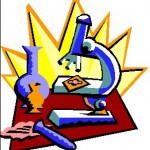February 26th, 2010 by Frank LaBanca, Ed.D.
 This past Wednesday, I hosted my annual science symposium at my school. The students who conduct year-long applied research projects participate by presenting a 10 to 15-minute oral with PowerPoint related to their topic. I try to make the experience as authentic as possible. Students send a written invitation to their parents, and I always ask them to select a teacher in the building and send them an invitation as well. One teacher attended, and provided me with the following email. My response to her follows. I think this written discussion we had indicates the nature of the power of authentic learning and its ability to affect student achievement:
This past Wednesday, I hosted my annual science symposium at my school. The students who conduct year-long applied research projects participate by presenting a 10 to 15-minute oral with PowerPoint related to their topic. I try to make the experience as authentic as possible. Students send a written invitation to their parents, and I always ask them to select a teacher in the building and send them an invitation as well. One teacher attended, and provided me with the following email. My response to her follows. I think this written discussion we had indicates the nature of the power of authentic learning and its ability to affect student achievement:
Hi there,
I really was so impressed with you and your students last night. What a successful event! It’s astounding to see what our kids are working on, Frank. And my goodness, you have taught them well in terms of presenting themselves, creating sound powerpoints, and articulating their projects. I kept thinking about the millions of questions you must be asked on a daily basis. I was incredibly impressed!
What I especially enjoyed was the practicality of the applications. That is something that isn’t lacking necessarily, but isn’t so evident in English. So that was incredible for me. Certainly, I had difficulty understanding much of what they were doing, but truly remarkable nonetheless.
You are an asset to this building (any building) and I just wanted to congratulate you.
Corey
Corey,
Thanks for your kind words.
About 12 years ago I realized that to really, really improve student achievement there had to be a sense of authenticity to the work that students do. It couldn’t be “LIKE REAL LIFE,” it had to be “REAL LIFE.” It couldn’t be learning for the sake of learning only, but rather inquiry learning in context, with applicable value. There had to be a real audience (in my case, practicing scientists and engineers) that would evaluate their work – not just me as the teacher. This made my role very different – the teacher as the facilitator instead of the didactic knowledge disseminator. Ultimately the students are going to be evaluated (judged) outside of the building, so it is in our collective best interest to work collaboratively, with me assuming the role of the mentor.
I started doing research with students, primarily because I found that a problem/project-based learning strategy was a method that worked very well for me as a learner. I also realized that in education we often scenarioize-to-death our perceived authentic assessments and projects, which I think takes away value. We also primarily use visual/auditory teaching and learning strategies with students, which often doesn’t meet the learning styles of all students. Some students are more global and tactile with their successful learning strategies.
I also believe in concept-based learning – “big ideas” as the focus of learning objectives – and teaching students to making connections between their knowledge. Project-based learning is inherently concept-based. If we improve the 21st-century skills of students (problem finding and solving, creativity, oral and written communication) using the content or project as the vehicle for skill development, then I think we really develop the learning potential and achievement in students.